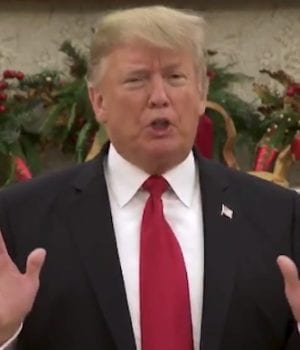Trump’s “national emergency” threat for wall probably wouldn’t pass SCOTUS – By Taylor Millard (hotair.com) / Jan 6 2019
President Donald Trump believes he can declare a national emergency to slip around Congress for the border wall.
The theory – chock full of unicorns expunging rainbows from their orifices – is one which probably wouldn’t make it through the Supreme Court, based on past precedent (this is despite Califonia Congressman Adam Schiff’s comment to ABC suggesting Trump could do it). Justices were confronted with this very issue in 1952 when President Harry Truman decided to nationalize the steel industry under the guise of a national emergency (the Korean War and fighting the USSR). Truman’s fury at the industry can be found in Executive Order 10340 which he authorized the nationalization.
WHEREAS a controversy has arisen between certain companies in the United States producing and fabricating steel and the elements thereof and certain of their workers represented by the United Steel Workers of America, CIO, regarding terms and conditions of employment; and
WHEREAS the controversy has not been settled through the processes of collective bargaining or through the efforts of the Government, including those of the Wage Stabilization Board, to which the controversy was referred on December 22, 1951, pursuant to Executive Order No. 10233, (2) and a strike has been called for 12:01 A.M., April 9, 1952; and
WHEREAS a work stoppage would immediately jeopardize and imperil our national defense and the defense of those joined with us in resisting aggression, and would add to the continuing danger of our soldiers, sailors, and airmen engaged in combat in the field; and
WHEREAS in order to assure the continued availability of steel and steel products during the existing emergency, it is necessary that the United States take possession of and operate the plants, facilities, and other property of the said companies…
Steel company owners sued over the seizure, arguing Truman’s declaration went far beyond any declared presidential power. The Supreme Court actually moved quickly in the Youngstown Sheet & Tube Co. v. Sawyer case and told Truman his edict was unconstitutional.
It is clear that if the President had authority to issue the order he did, it must be found in some provision of the Constitution. And it is not claimed that express, constitutional language grants this power to the President. The contention is that presidential power should be implied from the aggregate of his powers under the Constitution. Particular reliance is placed on provisions in Article II which say that “The executive Power shall be vested in a President . . .”; that “he shall take Care that the Laws be faithfully executed”; and that he “shall be Commander in Chief of the Army and Navy of the United States.”
The order cannot properly be sustained as an exercise of the President’s.military power as Commander in Chief of the Armed Forces. The Government attempts to do so by citing a number of cases upholding broad powers in military commanders engaged in day-to-day fighting in a theater of war. Such cases need not concern us here. Even though “theater of war” be an expanding concept, we cannot With faithfulness to our constitutional system hold that the Commander in Chief of the Armed Forces has the ultimate’ power as such to take possession of private property in order to keep labor. disputes from stopping production. This is a job for the Nation’s lawmakers, not for its military authorities.
Justice Hugo Black also wrote in the majority opinion only Congress “can authorize the taking of private property, for public use. It can make laws regulating the relationships between employers and employees, prescribing rules designed to settle labor disputes, and fixing wages and working conditions in certain fields of our economy.” It’s doubtful Congress would authorize this power, at the moment, and the Supreme Court would more than likely cite the Youngstown ruling as for why Trump’s “national emergency” belief wouldn’t work.
Now, what about eminent domain? It is, after all, his other rationalization for gobbling up land for the wall.
Trump floats the idea of using "the military version of eminent domain" to immediately seize privately owned land along border to build the wall
— Josh Lederman (@JoshNBCNews) January 4, 2019
Cato’s Walter Olson suggested on Twitter the Youngstown case also covers any eminent domain seizure. He expanded it by telling me, “Federal government can exercise eminent domain powers to take property for public use but not generally by a president ordering troops to seize.” He also noted the disastrous Kelo decision wouldn’t be a factor since the wall “is for public use,” not a private project.
Whatever decision the administration makes regarding some sort of national emergency will end up in the court system. It’s likely the Supreme Court would stay with past precedent instead of granting the executive new, expanded powers.




















